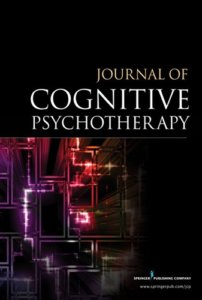- Last Updated
- Posted by
- Hypnotherapy
by Mark Davis, December 2018
If you search for the term “Cognitive Hypnotherapy” you are likely to initially come across a range of websites by UK based hypnotherapists and an NLP training school.
Also in the search results you will find books, academic articles and training courses that present a completely different version of “Cognitive Hypnotherapy” which appears to have nothing to do with NLP and is based on Cognitive Therapy as developed by Aaron T. Beck and Albert Ellis.
So which is correct?!
This article aims to clarify the use of the term, explain it's historical development and distinguish clearly between Cognitive Hypnotherapy (based on Ellis & Beck), vs “Cognitive Hypnotherapy” (based on NLP); and direct readers towards the textbooks and research articles that have been published by research-clinicians under the term “cognitive hypnotherapy”.
Also it's important to know that the term “cognitive hypnotherapy” (as in Cognitive Therapy from Beck and Ellis) regarded as synonymous with the term “cognitive behavioural hypnotherapy”.
(Just as Cognitive Therapy is often shorthand for Cognitive Behavioural Therapy. “Cognitive Therapy” as developed by Aaron Beck and Albert Ellis retained key elements from earlier Behaviour Therapy but added in and centralised “cognition” into the therapy equation).
Because of the potential confusion between Cognitive Hypnotherapy (Cognitive Therapy Beck-Ellis based) vs Cognitive Hypnotherapy (NLP based) there is need to clarify the term, and rescue it from its current misuse and misappropriation so that the general public or therapists are not misled.
History and Origins of “Cognitive Hypnotherapy”
1994 – Special Edition of The Journal of Cognitive Psychotherapy dedicated to “Cognitive Hypnotherapy”
The origins of the term “cognitive hypnotherapy” can be found primarily in the 1994 special edition of The Journal of Cognitive Psychotherapy, which focused on the integration of cognitive therapy with hypnotherapy: Volume 8 Issue 4 – Special Edition: Cognitive Hypnotherapy.

The special edition was edited by Dr Assen Alladin, who also contributed an article on “Cognitive Hypnotherapy for Depression”.
The following articles were in the special 1994 edition of that journal:
(with links to the abstracts)
Cognitive Hypnotherapy for Anxiety Disorders
by William Golden
Cognitive Hypnotherapy for Depression
by Assen Alladin
Cognitive Hypnotherapeutic Interventions in the Treatment of Multiple Personality Disorder
by Catherine Fine, PhD
Cognitive Hypnotherapy with Sexual Disorders
by Daniel Araoz et al
Cognitive Hypnotherapy in Psychosomatic Illness; A Cognitive Experiential Perspective
by Donald Tosi et al
A historical search reveals some earlier uses of the term. The first traceable appearance of “Cognitive Hypnotherapy' is an article by Milne in 1985 in The Australian Journal of Clinical Hypnosis (Volume 13) – and also in a 1986 article by Michael Tobin.
Earlier origins are clear in the rational hypnotherapy of Morton Prince (1907) and Albert Ellis' integration of hypnosis with REBT (can both be considered “cognitive hypnotherapy” – however the term was not formulated at those points. In 1984 Ellis published a journal article entitled “The use of hypnosis with Rational-Emotive Therapy (RET)” – in the article he draws upon earlier work – including Rational Stage Directed Hypnotherapy by Tosi (in the 1970's) and his own experience of using hypnosis and rational therapy with about 100 clients over the years – and claimed to have found it effective in about 80% of cases.
While various earlier forms are therefore present (REBT+Hypnotherapy, Rational Stage Directed Hypnotherapy etc) I think it can be quite definitively stated that 1994 is the year when “Cognitive Hypnotherapy” was established with the publication of entire issue of the Journal of Cognitive Psychotherapy dedicated to the topic.
[Please note that in all these cases it has nothing to do with NLP.]
1999 – the first book published with the title “Cognitive Hypnotherapy”
The term first appeared in a book title with the publication of Cognitive Hypnotherapy by Professor E. Thomas Dowd in 1999. , which included a glowing forward by none other than Aaron T Beck himself.
“Tom Dowd has taken the theory and practice of Cognitive Therapy one step further. He has integrated it with hypnosis and hypnotherapy and produced the first-ever book on that topic…. I have great regard for his theoretical and clinical ability, and I recommend this book highly for anyone interested in another important extension of the Cognitive Therapy model”
Aaron T. Beck, M.D. University of Pennsylvania, School of Medicine, December, 1999
Later, in 2007, Dr Alladin published “Cognitive Hypnotherapy for Depression: An Evidence-Based Approach”, and in 2008 “Cognitive Hypnotherapy: An Integrated Approach to the Treatment of Emotional Disorders”.
In 2007 Alladin also published his research results on cognitive hypnotherapy for depression. This study won Dr Alladin the best research paper from Division 30 of the American Psychological Association in 2007.


But what is Cognitive Hypnotherapy?
In all of these cases the term has been introduced within the context of Cognitive Therapy as developed by Aaron T Beck and Albert Ellis – and it is essentially shorthand for “Cognitive Behavioural Hypnotherapy”.
Cognitive Hypnotherapy takes an interesting angle on traditional Cognitive Therapy, as it assumes that most psychological disturbance is caused by a form of spontaneous negative self-hypnosis, in which negative thoughts and images are accepted uncritically and even without conscious awareness (Daniel Araoz, 1985).
Therefore the first therapeutic step is to bring these negative thoughts into awareness – allowing for distancing and disputation, and for alternative thoughts to be considered.
Then alternative, more helpful, realistic and rational thoughts are “installed” and rehearsed through hypnosis and self-hypnosis. These positive, realistic thoughts are particularly rehearsed during imagery of challenging situations while under hypnosis. Then client and therapist agree on a set of “behavioural experiments” to test out these alternative thoughts and beliefs between sessions. The combination of imagery rehearsal and then real life experience rapidly unfreezes old dysfunctional beliefs and new helpful beliefs and ideas take their place – and can then be further reinforced by traditional direct suggestion hypnosis.
However there is a common misunderstanding that “cognitions” means only thoughts – and ignores emotions and behaviour. (Indeed nearly every newspaper article critical of CBT makes this mistake). So many people believe that “cognitive therapy” only works at the level of the conscious mind and that CBT does not address “the unconscious mind” (or more accurately “unconscious processes).
This is a substantial error. Cognitive Therapy built upon and did not abandon concepts and practices from Behaviour Therapy, and Behaviour Therapy was mostly focused on Classical Conditioning (Pavlov) and Operant Conditioning (Skinner) – learning theories that do not require a conscious mind that can process verbal thoughts. (You can ask Pavlov's dog about this).
From the outset Cognitive Therapy built upon the unconscious learning processes established in Behaviour Therapy. Indeed Albert Ellis was always clear that thoughts (or cognitions if you will) included emotions and behaviour (see Albert Ellis, 2005): “you don't think without feeling and behaving, you don't feel without thinking and behaving, you don't act without thinking and feeling”.
Thus the focus of Cognitive Hypnotherapy is not only the identification of and “weakening” of negative (maladaptive) thoughts BUT also the rehearsal of new thoughts, emotions and behaviour under hypnosis in order to develop and strengthen new healthy integrated “response sets” or modes (ways of being/interacting). There is therefore extensive use of imagery in cognitive hypnotherapy – and it is this imagery rehearsal that allows for change at the levels of schemas and automatic (unconscious) processing; or what Tom Dowd called “tacit knowledge”, our “felt sense of knowing the world”.
However imagery in hypnosis takes on a special quality. Rather than being simply imagining hypnosis utilises a special type of “believed-in-imagining” (Sarbin & Coe), whereby we are invited to engage in the images and ideas “as-if-real”. It is this “virtual reality” aspect of hypnotic imagining that makes it so powerful and useful in the therapy room.
Cognitive Hypnotherapy Confusion!
Unfortunately there is a spreading use of the term “cognitive hypnotherapy” which has virtually no relationship to the term used by Alladin or Dowd – or anything to do with the cognitive therapy of Aaron Beck or Albert Ellis.
We've had several students complain that the term has is misused and it's use by hypnotherapist who are fundamentally NLP practitioners, rather than CBT based therapists, is quite misleading for the general public.
The background seems to be that an NLP training school appropriated (probably innocently) the term in 2007 and then published a book entitled “Cognitive Hypnotherapy” in 2010. Since then websites like The Guardian and The Hypnotherapy Directory have carried misguided articles on Cognitive Hypnotherapy.
To be clear, “Cognitive Hypnotherapy” is not, as one therapist's website states, “a blend of CBT, NLP, Positive Psychology and Gestalt Therapy.”
Indeed Professor Tom Dowd, who wrote the book Cognitive Hypnotherapy back in 2001 which included a glowing introduction by no less than Aaron Beck himself, was a vociferous researcher into counselling and psychotherapy and had published research critical of NLP, which he considered to be a cult (personal communication in Beijing, 2015).
We in no way wish to criticise or critique the NLP therapy and model that is presented as “cognitive hypnotherapy” – possibly when independent research is conducted it will prove to be as substantial and effective as CBT itself or cognitive behavioural hypnotherapy. However, the name is a misrepresentation which is misleading as its use bears virtually no connection to cognitive hypnotherapy as developed by Dr Assen Alladin, William Golden PhD, Daniel Aroaz or Professor E Thomas Dowd – and endorsed by Aaron T Beck.
Articles on Cognitive Hypnotherapy
You can read more here:
A Brief Introduction to Cognitive Behavioural Hypnotherapy
Strategies and Applications of Cognitive Behavioural Hypnotherapy
Hypno-CBT® & Cognitive Behavioural Hypnotherapy
The Cognitive Behavioural Hypnotherapy Toolbox of Techniques & Interventions (Hypno-CBT® Toolbox)

